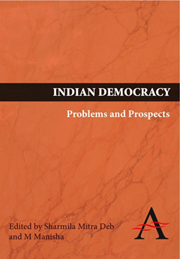Book contents
- Frontmatter
- Contents
- List of Contributors
- PREFACE
- Introduction DEMOCRATIC POLITICS IN INDIA: CONCEPTS, CHALLENGES AND DEBATES
- 1 RECONSTRUCTING DEMOCRATIC CONCERNS IN INDIA
- 2 ARE WE READY FOR DEMOCRACY? A FEW OBSERVATIONS
- 3 DEMOCRACY AND POVERTY IN INDIA
- 4 DEMOCRACY AND FEDERALISM IN INDIA: TWO EPISODES AND A SET OF QUESTIONS
- 5 INDIA'S COALITION FUTURE?
- 6 HOW DEMOCRATIC IS OUR PARLIAMENT? ELITE REPRESENTATION AND FUNCTIONAL EFFICIENCY OF LOK SABHA
- 7 DEMOCRACY'S JANUS FACE: A REVIEW OF ELECTIONS IN POST-INDEPENDENCE INDIA
- 8 THE NATURE OF THE OPPOSITION IN INDIA'S PARLIAMENTARY DEMOCRACY
- 9 RESTYLING DEMOCRACY? MAINSTREAM MEDIA AND PUBLIC SPACE VIS-À-VIS INDIAN TELEVISION
- 10 THE POOR WORKING WOMEN: THE ACHILLES HEEL OF INDIAN DEMOCRACY – A PROFILE OF THE MAIDSERVANT FROM THE BUSTEES OF KOLKATA
- 11 HOW IS DEMOCRACY IN SOUTH ASIA? A COMPARISON OF THE ELITE AND THE MASS ATTITUDES
8 - THE NATURE OF THE OPPOSITION IN INDIA'S PARLIAMENTARY DEMOCRACY
Published online by Cambridge University Press: 05 March 2012
- Frontmatter
- Contents
- List of Contributors
- PREFACE
- Introduction DEMOCRATIC POLITICS IN INDIA: CONCEPTS, CHALLENGES AND DEBATES
- 1 RECONSTRUCTING DEMOCRATIC CONCERNS IN INDIA
- 2 ARE WE READY FOR DEMOCRACY? A FEW OBSERVATIONS
- 3 DEMOCRACY AND POVERTY IN INDIA
- 4 DEMOCRACY AND FEDERALISM IN INDIA: TWO EPISODES AND A SET OF QUESTIONS
- 5 INDIA'S COALITION FUTURE?
- 6 HOW DEMOCRATIC IS OUR PARLIAMENT? ELITE REPRESENTATION AND FUNCTIONAL EFFICIENCY OF LOK SABHA
- 7 DEMOCRACY'S JANUS FACE: A REVIEW OF ELECTIONS IN POST-INDEPENDENCE INDIA
- 8 THE NATURE OF THE OPPOSITION IN INDIA'S PARLIAMENTARY DEMOCRACY
- 9 RESTYLING DEMOCRACY? MAINSTREAM MEDIA AND PUBLIC SPACE VIS-À-VIS INDIAN TELEVISION
- 10 THE POOR WORKING WOMEN: THE ACHILLES HEEL OF INDIAN DEMOCRACY – A PROFILE OF THE MAIDSERVANT FROM THE BUSTEES OF KOLKATA
- 11 HOW IS DEMOCRACY IN SOUTH ASIA? A COMPARISON OF THE ELITE AND THE MASS ATTITUDES
Summary
A strong and responsible opposition is a prerequisite to the viable functioning of parliamentary democracy, which is based on a party system. Benjamin Disraeli noted as far back as 1844 that ‘no government can be long secure without a formidable opposition’. The role of the opposition in a parliamentary system of government should be not just to act as a ‘government-in-waiting’, but also check any arbitrary tendencies of the government in power. An effective opposition performs a restraining role vis-à-vis the party in power, preventing it from transgressing its functional limits and simultaneously posing a constant challenge by promising a practical alternative. What should be emphasized is that the opposition should be a responsible one to be truly effective. In some well organized democracies, the role of the opposition is sometimes reduced to a mere tokenism as a result of long-term dominance by a single party. In others, particularly in post-colonial Third World states with long legacies of authoritarian rule, the opposition is deliberately kept weak by the dominant party, which perpetuates its power through unfair means while keeping up a semblance of electoral rule. Historically, parliamentary opposition has appeared to function better in systems where there are two major parties. In multiple party states, there may be more than one opposition party, and such parties may have little in common and therefore, a minimal desire to unite. When coalitions occur, these could prove fragile because of different aims and objectives of the constituent parties.
- Type
- Chapter
- Information
- Indian DemocracyProblems and Prospects, pp. 107 - 128Publisher: Anthem PressPrint publication year: 2009



